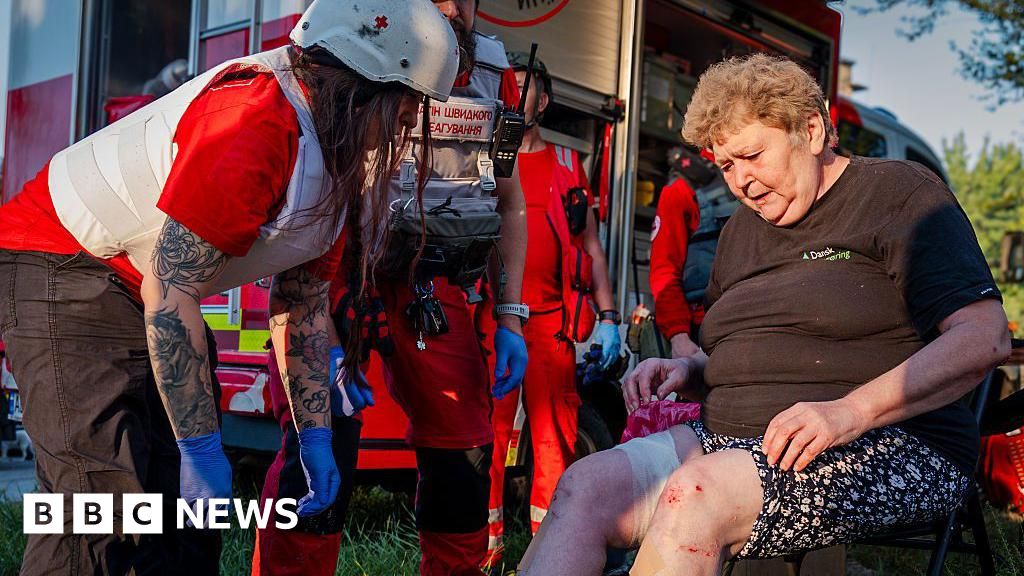Lives torn apart in Kyiv after Russias heaviest bombardment for weeks
- BBC News
By day, Kyiv can often feel far from the front line. But at night, the war looms large.
In the morning rush hour, the traffic along the Dnipro river embankment is heavy and slow-moving as people try to get to work and go about their daily lives.
During the night, every so often, the air raid sirens go off. Much of the time, people glance at their phones and then decide on their plan of action, depending on the threat.
Last night, monitoring channels such as Telegram alerted Kyiv residents to a potentially heavy attack involving not just drones but missiles too.
They are not always accurate, but this time the air raid sirens rang and people listened.
The muffled thud of air defences intercepting drones and missiles was the soundtrack to most of the night. People can sleep through them.
But then, around 03:00, there was a loud explosion – the sound of a missile that had hit a building. It was enough to wake people up across the city.
People made their way to the shelter. Every so often, we could hear the whirr of a drone overhead; then flashes of light as some were shot down and they fell from the sky.
After the big explosion that woke us up, we could see huge plumes of smoke on the horizon.
That, we now know, was the strike on the Darnytskyi district on Kyivs left bank.
It was hit by at least one missile, on a night that Russia fired almost 600 drones and more than 30 missiles, according to the Ukrainian military.
Missile and drone strikes were recorded in 13 different locations, and the attack on Darnytskyi was the most deadly.
Arriving at the site on Wednesday morning, we could see the aftermath for ourselves.
The missile ripped through the middle of the low-rise block of flats; the five floors had totally collapsed where it hit.
Rescue workers were clambering over the rubble – some of it was still smouldering.
The brick and wrought-iron balconies were twisted in the blast, some hanging by a thread. Plant pots and fruit baskets sat on broken windowsills, a reminder of the families that until hours earlier had led their lives tucked away behind these walls.
Diggers and trucks were lining up to collect broken bits of the building and clear the way for the workers, trying to sift through the debris in the hope of finding survivors.
Every so often, a stretcher with a body bag was delivered – a victim found in the rubble.
Nearby, Iryna Kutsenko was sitting on a chair, her mobile phone to her ear.
Since 03.30 she has tried desperately to contact her mother Liubov. Every time she calls, it just rings out.
"You never think it will be your house thats hit," she says, starting to cry. Her mother didnt want to go to the shelter. She was a slower walker than Iryna so decided to shelter in the corridor.
"These attacks are very cruel," Iryna says. "They happen at a time when people are sleeping and you are unable to get your bearings."
"And they are attacking with everything all together - missiles and Shaheds (drones). They all attack at the same time. Its just impossible to live like this."
Also on site was Minister for Foreign Affairs Andrii Sybiha.
What do these attacks mean for the current bid to end the war? I ask him.
"This is a pure example of a terrorism attack," he tells me. "Thats the response of Russia for all our peace proposals and all our peace efforts."
The death toll in Kyiv climbed throughout the day, with at least 19 killed including four children.
Oksana Rumpik, 54, and her husband Mykhailo survived the missile strike on the block of flats, but their gold-coloured Volvo car was hit by shrapnel.
"I just cant," she says, unable to finish her sentence when asked what she makes of the Russian strikes.
"People are dying, simple people are dying. So many are dying, you just cannot imagine."
Her husband believes the only path to peace is without Vladimir Putin.
"If there are negotiations and peace, Putin [cant] be president," he says, before conceding thats an unlikely scenario as he clings to power.
Its been 40 months now since Russias full-scale invasion but the reality of war in Ukraines capital is never far away.